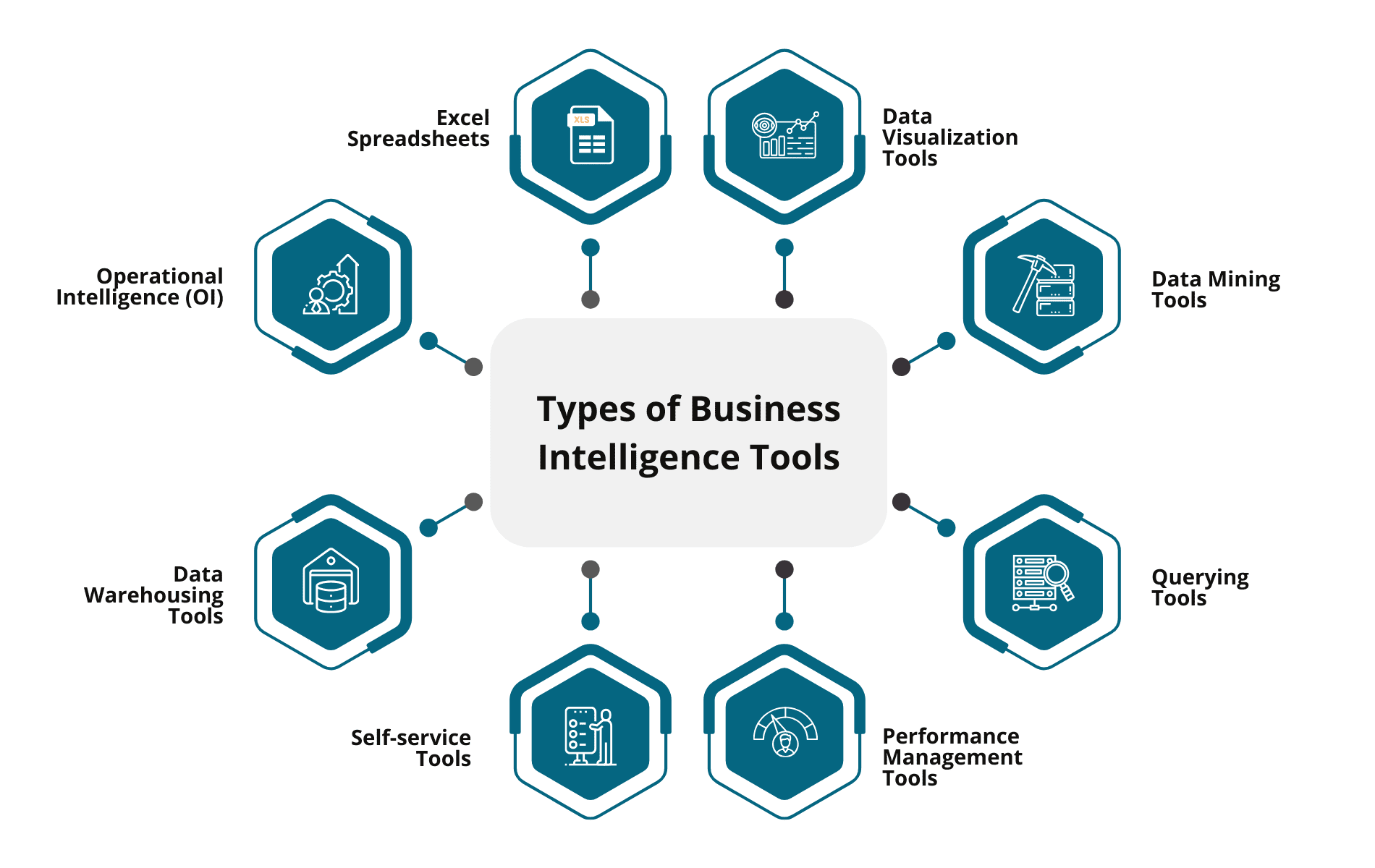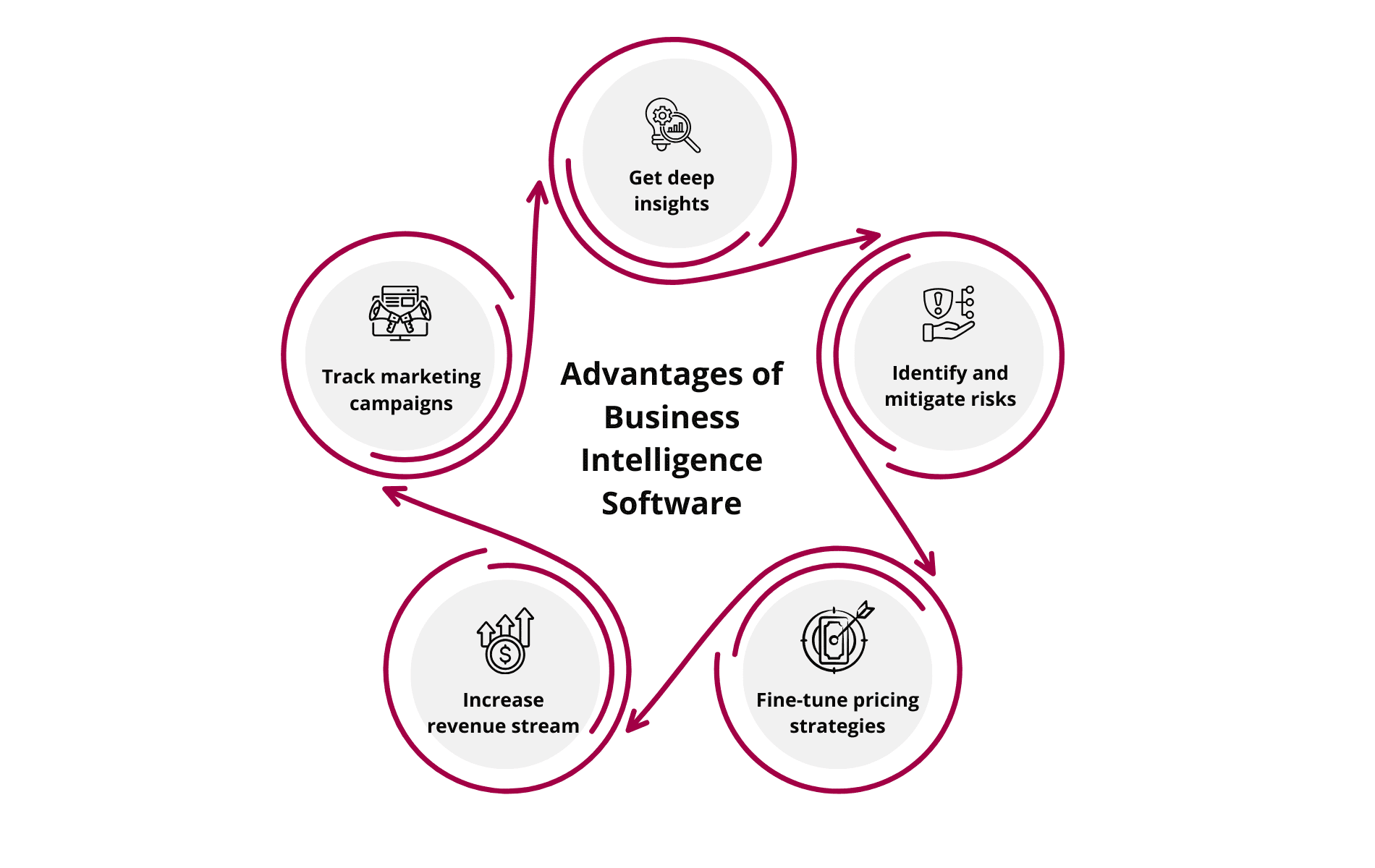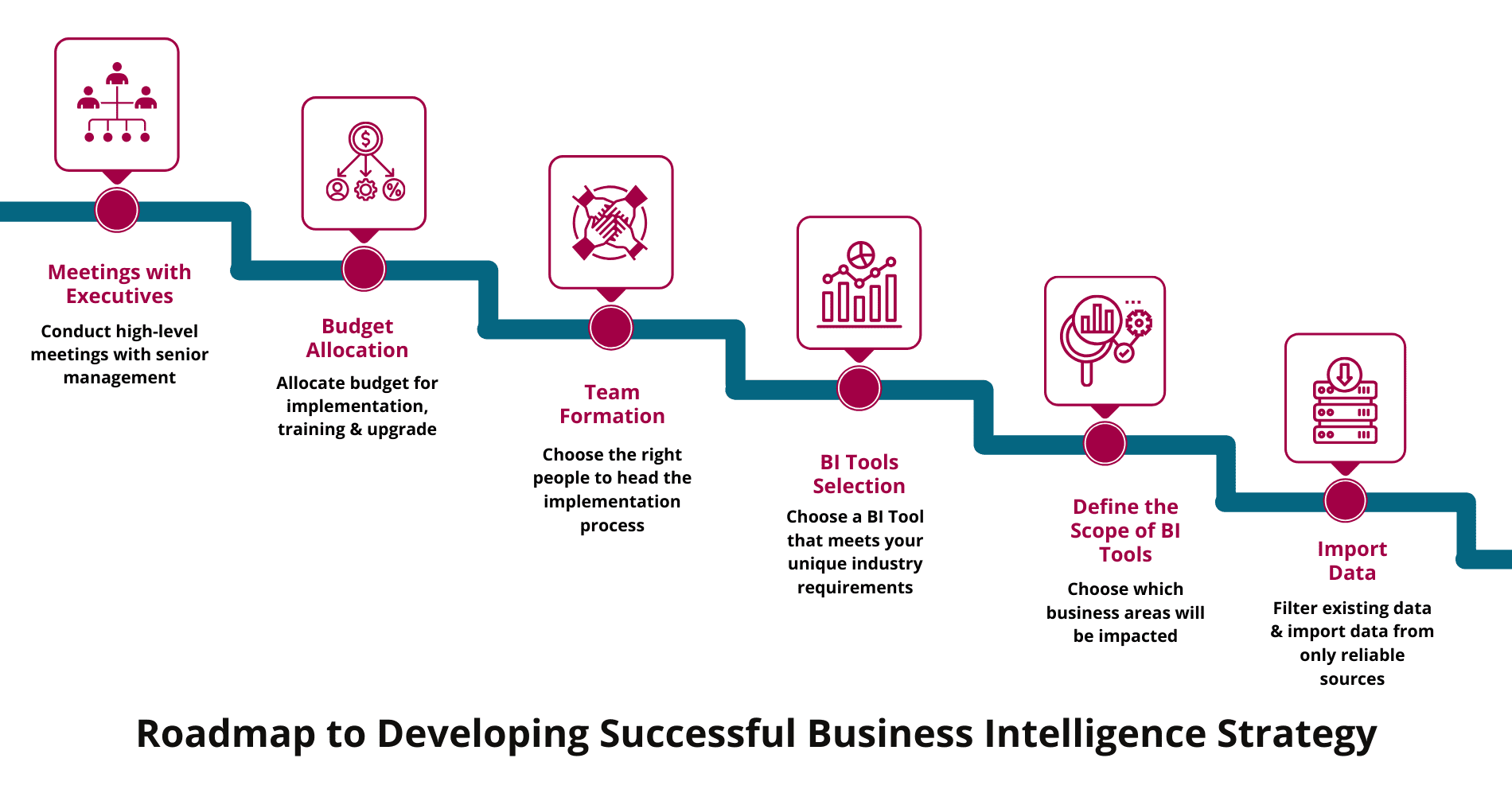Business Intelligence Software (BI Tools)
Business Intelligence Software transforms your raw data into actionable insights to fuel business growth and accelerate expansion

What is Business Intelligence Software (BI Tools)?
Business Intelligence Software is a type of computer application that collects, filters, analyzes, organizes, and processes unstructured & unorganized data, and provides a cohesive view and a holistic analysis of the business operations through intuitive charts, actionable reports, and custom dashboard, to influence the decision-making process at all the organizational levels.
In today’s business landscape where companies are facing tremendous competition from both domestic and international firms and consumer decisions are reshaping the market segments, Business Intelligence Software has gained more significance than ever. Senior executives across all business types and sizes rely on powerful BI Tools to quickly adapt to changing market trends, cut costs, gain agility in decision-making, and improve competitiveness.
Types of Business Intelligence Tools (BI Tools)
Business Intelligence Tools (BI Tools) can be broadly classified into the following types:
1. Excel Spreadsheets
Excel and Google Sheets spreadsheets are one of the most commonly used BI tools. Many companies across the world use them for visual analysis and to build data models. Businesses can also leverage various free and paid Excel templates available on the Web.
2. Data Visualization Tools
Data Visualization Tools help with the visualization of your data to obtain meaningful insights and quickly share them in business meetings. They provide an intuitive graphical interface to turn complex data into simple-to-understand graphical representations.
3. Data Mining Tools
Data Mining Tools are used in combination with Machine Learning (ML) and Artificial Intelligence (AI) tools to mine massive datasets and unveil trends & patterns. In simple words, it turns complex data sets into clear, refined & human-readable information.
4. Querying Tools
The primary purpose of the Querying Tools is to provide queries and reports, in addition to advanced data filtering options. There are many querying tools available in the market — both open-source & paid.
5. Performance Management Tools
These are primarily used by the senior management (executive-level leaders). The purpose of these types of BI tools, is to compare the target performance with the actual using Key Performance Indicators (KPIs). They are helpful in understanding the effectiveness of the new strategies adopted by the management.
6. Self-service Tools
As the name describes, these tools are designed to allow data analysts to analyze a large chunk of data without relying on the company’s IT department. These tools are easy and beginner-friendly. They are primarily meant to be used by anyone without technical knowledge.
7. Data Warehousing Tools
Data Warehousing Tools consolidate data from different sources and departments across your organization and store it in a single database. Executives can get up-to-the-minute information about any business process using BI Tools without needing to consult the departmental head or lower-level employees.
8. Operational Intelligence (OI)
Operational Intelligence (OI) is used to get quick insights into business operations, bring agility into the company’s decision-making, and improve competitiveness. They address specific departmental issues such as customer-centric issues for the support department, distribution issues for the logistics department, and so on.
Features of Business Intelligence Software
1. Intuitive Charts
Business Intelligence Software extracts raw data from different sources and converts it into intuitive charts, reports, customized dashboards, and actionable insights. It helps decision-makers get a thorough understanding of the business operations, and find trends, patterns & seasonal fluctuations.
2. What If Analysis
What If Analysis is an important aspect of strategic planning and decision-making. Business Intelligence Software assists decision-makers in understanding the potential impacts of their future decisions using Predictive Analysis, Artificial Intelligence, and similar technologies. As a result, decision-makers can make informed decisions and reduce the negative impact of their decisions on the business’s health & operations.
3. Legacy Integration
Some businesses prefer to use Business Intelligence Software alongside their legacy tool. Business Intelligence Software integrates with your legacy system to ensure seamless data sharing and exchange of information in real time. You can track the progress using various Key Performance Indicators (KPIs).
4. Data Security
Another key feature of Business Intelligence Software is data security. Business Intelligence Software comes into three types, viz. On-premise ERP, Cloud ERP, and Hybrid ERP. The cloud type of BI tools, store your organizational data on the vendor’s server while employing stringent industry measures to ensure the data is safe & secure.
5. System Scalability
As your business grows in size and reaches new highs, it needs an efficient system that continues to work smoothly despite an increase in the volume of data and transactions. Business Intelligence Software provides a flexible, scalable, and customizable system to support your increasing business needs and eliminate discrepancies.
Traditional Business Intelligence Vs Modern Business Intelligence Tools
Now, let us discuss the key differences between Traditional Business Intelligence and Modern Business Intelligence Tools in a tabular format.
Traditional Business Intelligence | Modern Business Intelligence Tools | |
|---|---|---|
Method of Deployment | It is deployed on the organization’s IT infrastructure
| It is deployed on the vendor’s IT servers |
Data Accessibility
| Employees need to be physically present at the company’s premises | Employees can access the data anywhere & anytime remotely
|
Maintenance & Upgrade | The company allocates a separate team of professionals to look after the maintenance & upgrade | The vendor is responsible for maintenance & upgrade |
Scalability
| Offers limited scalability | Offers scalability benefits as the organization expands in size & operations
|
Data Security
| The data is secured and controlled through internal organizational policies
| Vendor adopts stringent security policies to meet modern industry standards |
Cost
| Higher upfront fees & upgrade costs
| Lower fees (Subscription-based pricing model) |
Which Type of Decision-making Business Intelligence Empowers?
Business Intelligence (BI Software) empowers businesses with the following types of decision-making:
1. Strategic Decisions
Business Intelligence aids with the strategic-level decisions taken by the higher management of the company. Typically, these decisions are not limited to a specific project. Instead, they can have a long-lasting impact on the company’s operations and financial position.
2. Tactical Decisions
Tactical decisions are usually taken for implementing the guidelines led out by the company’s directors or higher management. These decisions can impact different aspects of the company’s operations from workforce, operations to marketing.
3. Operational Decisions
The operational decisions are taken out by the departmental heads and managers for implementing the long-term visions set by the directors and higher management at the base level. Operational decisions may also involve identifying and solving different operational challenges.
Benefits of Deploying Business Intelligence Software (BI Tools)
Why are an increasing number of businesses adopting Business Intelligence Software (BI Tools)? Here are the potential benefits of ERP:
1. Actionable Insights
Business Intelligence Software provides deep insights into business operations and financial statements for making futuristic predictions about consumer demands, sales, revenue streams, and the company’s financial health. They influence the strategic decisions taken by the senior management for business expansion and growth.
2. Better Product Offerings
Without BI Tools, businesses can get a deeper understanding of consumer psychology and factors that influence buying decisions. BI Tools can form better strategies and effectively focus their promotional and marketing campaigns for profit maximization.
3. Mitigate Risks
Risk Mitigation is one of the core benefits of Business Intelligence Software. With a better understanding of the market segment and access to authentic information using BI Tools, decision-makers can take proactive measures to mitigate risks or lower their impact.
4. Track Marketing Campaigns
Marketing campaigns are vital for businesses to build awareness about their brand, increase engagement, and convert leads into customers. The sales management system in BI Tools empowers companies to measure the success of their marketing campaigns, fine-tune their pricing strategies, and elevate customer experience.
5. Increase Revenue Stream
Data is often termed as new oil. Unfiltered & unrefined data may not be very helpful to businesses. BI Tools collect, filter, analyze, process, and turn the raw data into a Single Source of Truth and an invaluable asset. As a result, decision-makers rely on strongly data-backed decisions, rather than gut feelings.
Limitations of Business Intelligence Software
Business Intelligence Tools are incredibly useful and powerful for smart decision-making. However, much like any other technology, it has some limitations:
1. Higher Upfront Cost
Small and medium-sized businesses often find it difficult to deploy Business Intelligence Tools because of the higher upfront cost that consists of licensing fees, hardware degradation, and IT costs. However, BI Tools are a worthwhile investment because of the various benefits they offer from long-term cost savings, higher productivity, process standardization, and competitive advantages.
2. Unstructured Data
Business Intelligence Software works its wonders when the data across your organization is structured, well-defined, and well-organized. However, in practice, the data across an organization can be stored in diverse formats and fragmented across different locations. Such data is required to be filtered and cleaned for further processing, which can be a daunting and time-consuming task.
3. Reliability of Forecasts
Business Intelligence tools analyze large volumes of historical data. In the absence of complete and correct information, there is a risk of inaccurate predictions about market demand, future sales, and the company’s performance. Moreover, there are two types of data — quantitative & qualitative data. Measuring the qualitative data such as customer satisfaction, can be a challenging task.
4. Employee Resistance to Change
One of the challenges businesses face during the implementation phase is employee’s resistance to change. Some employees are reluctant to change and adopt new technology. They may be unwilling to learn about the new technology & tools. As a business owner, you will need to communicate the benefits and get people involved to harness the true power & potential offered by BI tools.
Roadmap to Developing Successful Business Intelligence Strategy Using BI Solutions
Here are the steps for developing a successful Business Intelligence strategy using BI Software:
1. Meetings with Executives
First things first, you will need to conduct regular meetings with the senior-level leaders. They will sponsor the cost of the ERP implementation and appoint appropriate employees to look after the entire implementation & post-implementation processes.
2. Budget Allocation
The next step is to allocate a sufficient budget for Best Business Intelligence Tools. Avoid exceeding your budget at all times, and complying with the pre-decided spending. This will ensure a smooth transition to the new system. Remember, you may also incur training and implementation costs in addition to the initial ERP cost.
3. Team Formation
Another important step in developing a successful Business Intelligence strategy is to form teams. These teams may comprise employees from different departments, rather than a specific department to ensure pan-organization successful implementation of the new ERP software
4. Choose BI Tools
The next step is to choose BI Tools that meet the visions and strategic objectives of your organization and have a positive track record of several years in the industry. You will also want to choose specific ERP modules that can empower specific areas of your business operations. For example, if you’re a manufacturer of toys, your best bet is to opt for manufacturing ERP software. Similarly, if you’re a food producer, choose an ERP for food industry.
5. Define Scope of BI
Defining the scope of the BI Tools is essential to ensure it aligns with the preplanned vision and strategic objectives of your organization. Furthermore, it will help allocate sufficient resources (human, assets, and budget) at each level.
6. Import Authentic Data
The next step is to import data from different sources across your organization. These sources may include numerous spreadsheets, financial reports, and Customer Relationship Management (CRM) tools, among others. It’s important to filter your data before importing to ensure you do not import data from untrusted & unreliable sources.
Key Points to Consider While Choosing the Best Business Intelligence Tools
Here are the key factors that need to be taken into consideration while choosing Business Intelligence Software for your business:
1. Adoption of Modern Technology
Make sure that your Business Intelligence Software supports modern features and capabilities. It should be flexible and scalable. As your business grows, your ERP application should handle the increasing data needs without encountering errors, performance drops, or other disruptions.
2. Cloud Integration
Cloud ERP comes with a Software-as-a-Service model where vendors manage everything from storage, maintenance, and upgradation. Cloud technology has been gaining immense popularity because it allows employees to work remotely no matter where they are and which device they use. Moreover, there are no upfront costs.
3. Vendor Reputation
While choosing the best ERP software in India, it’s important to perform deep research about the vendor’s background such as how long he has been in the market, whether he has a thorough understanding of your industry requirements, and how good has been the after-sales service. Knowing this in detail will help you avoid mishaps in the deployment stage and prevent disruptions.
4. Extended Customizability
When it comes to businesses, there is no “one-size-fits” solution. A good Business Intelligence Software should offer extended customization features so that your business can fine-tune it for its unique organizational requirements. For example, ERP for pharmaceutical industry should offer extended customization options tailored to the specific needs of the pharmaceutical businesses.
5. Legacy Integration
Another factor to consider is the integration of your business management software with legacy systems. Legacy integration aims to boost your employee’s productivity and reduce the time it takes to transfer data between multiple systems. If your Business Intelligence Software offers legacy integration, it will make it easier to share data seamlessly between multiple systems.
Empowering Your Business Success with Sage X3
Business Intelligence software enables businesses to reduce data complexities, rip the benefits of advanced methodologies, and stay on the front foot of innovation & technological adoption. It automates the key business processes, supports strategic business planning, provides predictive insights, and accelerates data-backed decision-making.
Sage X3 is a must-have solution for businesses that want to build a richer intelligence environment, convert inefficiencies into efficiency gains, and free up employee time & organizational resources for higher strategic endeavors. It serves as a crucial tool to pinpoint operational bottlenecks, and improve the quality of higher-level decision-making, and promote growth & success.
Top Industries Leveraging ERP Software
Food & Beverage
Alcohol
Pharmaceuticals
Advertising
IT Services
Furniture
Manufacturing
Auto Ancillary
Pharma Trading
Packaging
Medical Device
Chemical
Plastic
Brewery
Logistics
Automotive
Frequently Asked Questions
Who Uses the Business Intelligence Tools?
Best Business Intelligence Tools are used across businesses of all types. However, they are commonly popular across the following professions:
Higher Management: Executives use bi solutions to gain insights into business operations and make data-driven decisions to cut manufacturing costs, and reduce inefficiencies.
Government Bodies: The Govt uses BI tools to analyze & process massive datasets from tax records & public records, and better allocate their resources, and tailor their policies.
Data Analysts: BI Software has proven to be a game-changer for data analysts for importing information from different sources, and visualizing trends & patterns.
IT Engineer: They use bi solutions to determine the operational readiness of their IT infrastructure, mitigate risks, detect user-behavioral patterns, and prioritize essential tasks.
Sales Team: They use the Best Business Intelligence Tools to unveil demand for their products, analyze customer behavior, track sales performance, and comprehensive sales management.
What are Self-service Business Intelligence Solutions?
Over the years, BI Solutions has gone through a tremendous improvement. Self-service Business Intelligence Solutions are one such aspect that empowers non-tech-savvy people with limited or no technical knowledge to explore and analyze large datasets and make informed decisions. They provide a beginner-friendly and intuitive interface to gain insights into business operations, visualize the potential impacts of their decisions, and drive growth & success. The primary purpose of Self-service bi solutions is to empower people outside the IT Department to easily explore, understand and comprehend data.
What are the Applications of Business Intelligence?
Here are the applications of Business Intelligence (BI):
Strategic Decision-making: Process large datasets, and gain insights into new trends & patterns for quick & informed decision-making.
Predict Future Events: BI analyzes past historical occurrences, reveals key information, and makes foresight to stay ahead of the curve.
Actionable Insights: BI helps decision-makers with business-critical insights by aggregating data from different sources & departments.
Improve Efficiency: BI helps your business identify key areas of improvement, and take strategic measures to improve efficiency & make structural changes.
Compare Scenarios: It simplifies the complex decision-making process by visualizing the impact of potential decisions for risk identification & mitigation.
What is the Difference Between BI and Data Analytics?
Business Intelligence (BI) primarily relies on descriptive methods of analysis. It analyzes historical data and performs a comprehensive analysis to identify trends & patterns, performance gaps, and areas of improvement. In contrast, Data Analytics uses various methods such as descriptive analysis, predictive analysis, prescriptive analysis, and diagnostic, among others. It is primarily used by data scientists as it requires extensive experience in data science.
Which Industries Benefit the Most from Business Intelligence Software?
Business Intelligence Software is used in a wide range of industries. Here are the industries that benefit the most from BI Software:
- Manufacturing Industry: BI Software plays a critical role in providing key insights for effective demand planning, production scheduling, and production control.
- Retail Industry: BI Solutions help retailers improve the effectiveness of their marketing campaigns and automate inventory management operations.
- Food Industry: BI Tools enable food & beverage manufacturers to set better pricing strategies, forecast demand for their food products, and manage perishable items.
- Pharmaceutical Industry: Business Intelligence Software helps pharma companies monitor regulatory aspects, reduce compliance risks, and ensure a smooth supply chain.
- Auto Ancillary Industry: BI Software is used by the auto ancillary industry for production planning & scheduling, quality control, and ensuring optimum utilization.
Schedule Product Tour
"*" indicates required fields


